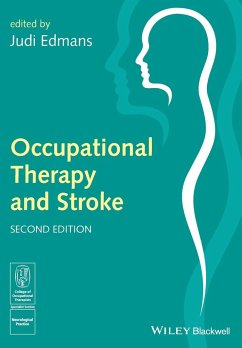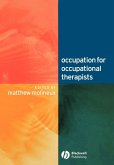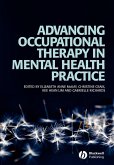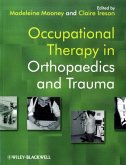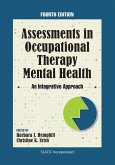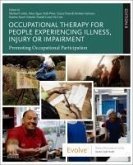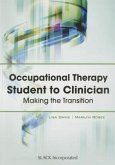Occupational Therapy and Stroke
Herausgeber: Edmans, Judi
Occupational Therapy and Stroke
Herausgeber: Edmans, Judi
- Broschiertes Buch
- Merkliste
- Auf die Merkliste
- Bewerten Bewerten
- Teilen
- Produkt teilen
- Produkterinnerung
- Produkterinnerung
Occupational Therapy and Stroke guides newly qualified occupational therapists (and those new to the field of stroke management) through the complexities of treating people following stroke. It encourages and assists therapists to use their skills in problem solving, building on techniques taught and observed as an undergraduate.
Andere Kunden interessierten sich auch für
![Occupation for Occupational Therapists Occupation for Occupational Therapists]() Matthew MolineuxOccupation for Occupational Therapists61,99 €
Matthew MolineuxOccupation for Occupational Therapists61,99 €![Advancing Occupational Therapy in Mental Advancing Occupational Therapy in Mental]() Elizabeth McKay (University of Limerick)Advancing Occupational Therapy in Mental82,99 €
Elizabeth McKay (University of Limerick)Advancing Occupational Therapy in Mental82,99 €![Occupational Therapy in Orthopaedics and Trauma Occupational Therapy in Orthopaedics and Trauma]() Occupational Therapy in Orthopaedics and Trauma86,99 €
Occupational Therapy in Orthopaedics and Trauma86,99 €![Occupational Hygiene Occupational Hygiene]() Kerry Gardiner / Harrington, Malcolm, J.Occupational Hygiene244,99 €
Kerry Gardiner / Harrington, Malcolm, J.Occupational Hygiene244,99 €![Assessments in Occupational Therapy Mental Health Assessments in Occupational Therapy Mental Health]() Barbara J. HemphillAssessments in Occupational Therapy Mental Health97,99 €
Barbara J. HemphillAssessments in Occupational Therapy Mental Health97,99 €![Occupational Therapy for People Experiencing Illness, Injury or Impairment Occupational Therapy for People Experiencing Illness, Injury or Impairment]() Occupational Therapy for People Experiencing Illness, Injury or Impairment71,99 €
Occupational Therapy for People Experiencing Illness, Injury or Impairment71,99 €![Occupational Therapy Student to Clinician Occupational Therapy Student to Clinician]() Lisa DavisOccupational Therapy Student to Clinician74,99 €
Lisa DavisOccupational Therapy Student to Clinician74,99 €-
-
-
Occupational Therapy and Stroke guides newly qualified occupational therapists (and those new to the field of stroke management) through the complexities of treating people following stroke. It encourages and assists therapists to use their skills in problem solving, building on techniques taught and observed as an undergraduate.
Produktdetails
- Produktdetails
- Verlag: John Wiley and Sons Ltd
- 2 ed
- Seitenzahl: 272
- Erscheinungstermin: 13. Oktober 2017
- Englisch
- Abmessung: 244mm x 170mm x 14mm
- Gewicht: 464g
- ISBN-13: 9781405192668
- ISBN-10: 1405192666
- Artikelnr.: 29830880
- Herstellerkennzeichnung
- Libri GmbH
- Europaallee 1
- 36244 Bad Hersfeld
- gpsr@libri.de
- Verlag: John Wiley and Sons Ltd
- 2 ed
- Seitenzahl: 272
- Erscheinungstermin: 13. Oktober 2017
- Englisch
- Abmessung: 244mm x 170mm x 14mm
- Gewicht: 464g
- ISBN-13: 9781405192668
- ISBN-10: 1405192666
- Artikelnr.: 29830880
- Herstellerkennzeichnung
- Libri GmbH
- Europaallee 1
- 36244 Bad Hersfeld
- gpsr@libri.de
Dr Judi Edmans is an Occupational Therapy Researcher in the Division of Rehabilitation and Ageing, School of Community Health Sciences, Queens Medical Centre, Nottingham. She is Editor of 'Neurological Practice'.
List of Contributors.
Foreword.
Preface.
Acknowledgements.
1 Introduction (Judi Edmans, Fiona Coupar and Adam Gordon).
Definition of stroke.
Impact of stroke.
Symptoms of stroke.
Causes of stroke.
Classification of stroke.
International Classification of Functioning, Disability and Health.
Medical investigations following stroke and TIA.
The prevention of recurrence of stroke (secondary prevention).
Neuroanatomy.
Damage that can occur in different areas of the brain.
Policy documents relating to stroke.
Self-evaluation questions.
2 Theoretical Basis (Janet Ivey and Melissa Mew).
Introduction.
Theoretical constructs.
Conceptual models of practice.
Frames of reference.
Neuroplasticity.
Intervention approaches.
Self-evaluation questions.
3 The Occupational Therapy Process (Melissa Mew and Janet Ivey).
Introduction.
The occupational therapy process.
Professional duties.
Self-evaluation questions.
4 Early Management (Sue Winnall and Janet Ivey).
Introduction.
Prior to assessment.
Initial interview.
Initial assessment.
Intervention.
Equipment.
Other impairments impacting on functional ability.
Swallowing.
Mood.
Fatigue.
Self-evaluation questions.
5 Management of Motor Impairments (Stephanie Wolff, Thèrèse Jackson and
Louisa Reid).
Introduction.
Assessment.
Management principles and intervention.
Therapeutic aims of intervention.
Positioning the early stroke patient.
Self-care activities.
Clinical challenges
Upper limb re-education.
Avoiding secondary complications.
Self-evaluation questions.
6 Management of Visual and Sensory Impairments (Melissa Mew and Sue
Winnall).
Introduction.
Visual processing.
Assessment.
Somatosensory processing.
Theoretical approach.
Assessment.
Auditory processing.
Assessment.
Vestibular processing.
Assessment.
Olfactory and gustatory processing.
Self-evaluation questions.
7 Management of Cognitive Impairments (Thèrèse Jackson and Stephanie Wolff
).
Definition of cognition.
Cognitive functions.
Assessment of cognitive functions.
Cognitive rehabilitation.
Attention.
Memory.
Language.
Motor planning and apraxia.
Executive dysfunction.
Self-evaluation questions.
8 Management of Perceptual Impairments (Louisa Reid and Judi Edmans).
Introduction.
Definition of perception.
Normal perception.
Perceptual impairments.
Perceptual assessment.
Intervention.
General intervention tips.
Specific intervention strategies.
General assessment and intervention plan.
Self-evaluation questions.
9 Resettlement (Pip Logan and Fiona Skelly).
Home visits.
Community rehabilitation.
Support available after a stroke and self-management.
Carers.
Younger people.
Lifestyle and long-term management.
Leisure rehabilitation.
Getting out of the house and transport.
Driving after stroke.
Vocational rehabilitation.
Resuming sexual activity.
Stroke education.
Self-evaluation questions.
10 Evaluation (Fiona Coupar and Judi Edmans).
Record keeping.
Methods of recording occupational therapy intervention.
Pros and cons of multidisciplinary joint documentation.
Standardised assessments.
Differential diagnoses.
Useful assessments.
Evidence-based practice (EBP).
Appraising the identified evidence.
Implementing findings into clinical practice and evaluating outcomes.
Outcome measures.
Standards.
Self-evaluation questions.
Appendix: One-Handed Techniques.
References.
Definitions.
Useful Books.
Useful Organisations.
Index.
Foreword.
Preface.
Acknowledgements.
1 Introduction (Judi Edmans, Fiona Coupar and Adam Gordon).
Definition of stroke.
Impact of stroke.
Symptoms of stroke.
Causes of stroke.
Classification of stroke.
International Classification of Functioning, Disability and Health.
Medical investigations following stroke and TIA.
The prevention of recurrence of stroke (secondary prevention).
Neuroanatomy.
Damage that can occur in different areas of the brain.
Policy documents relating to stroke.
Self-evaluation questions.
2 Theoretical Basis (Janet Ivey and Melissa Mew).
Introduction.
Theoretical constructs.
Conceptual models of practice.
Frames of reference.
Neuroplasticity.
Intervention approaches.
Self-evaluation questions.
3 The Occupational Therapy Process (Melissa Mew and Janet Ivey).
Introduction.
The occupational therapy process.
Professional duties.
Self-evaluation questions.
4 Early Management (Sue Winnall and Janet Ivey).
Introduction.
Prior to assessment.
Initial interview.
Initial assessment.
Intervention.
Equipment.
Other impairments impacting on functional ability.
Swallowing.
Mood.
Fatigue.
Self-evaluation questions.
5 Management of Motor Impairments (Stephanie Wolff, Thèrèse Jackson and
Louisa Reid).
Introduction.
Assessment.
Management principles and intervention.
Therapeutic aims of intervention.
Positioning the early stroke patient.
Self-care activities.
Clinical challenges
Upper limb re-education.
Avoiding secondary complications.
Self-evaluation questions.
6 Management of Visual and Sensory Impairments (Melissa Mew and Sue
Winnall).
Introduction.
Visual processing.
Assessment.
Somatosensory processing.
Theoretical approach.
Assessment.
Auditory processing.
Assessment.
Vestibular processing.
Assessment.
Olfactory and gustatory processing.
Self-evaluation questions.
7 Management of Cognitive Impairments (Thèrèse Jackson and Stephanie Wolff
).
Definition of cognition.
Cognitive functions.
Assessment of cognitive functions.
Cognitive rehabilitation.
Attention.
Memory.
Language.
Motor planning and apraxia.
Executive dysfunction.
Self-evaluation questions.
8 Management of Perceptual Impairments (Louisa Reid and Judi Edmans).
Introduction.
Definition of perception.
Normal perception.
Perceptual impairments.
Perceptual assessment.
Intervention.
General intervention tips.
Specific intervention strategies.
General assessment and intervention plan.
Self-evaluation questions.
9 Resettlement (Pip Logan and Fiona Skelly).
Home visits.
Community rehabilitation.
Support available after a stroke and self-management.
Carers.
Younger people.
Lifestyle and long-term management.
Leisure rehabilitation.
Getting out of the house and transport.
Driving after stroke.
Vocational rehabilitation.
Resuming sexual activity.
Stroke education.
Self-evaluation questions.
10 Evaluation (Fiona Coupar and Judi Edmans).
Record keeping.
Methods of recording occupational therapy intervention.
Pros and cons of multidisciplinary joint documentation.
Standardised assessments.
Differential diagnoses.
Useful assessments.
Evidence-based practice (EBP).
Appraising the identified evidence.
Implementing findings into clinical practice and evaluating outcomes.
Outcome measures.
Standards.
Self-evaluation questions.
Appendix: One-Handed Techniques.
References.
Definitions.
Useful Books.
Useful Organisations.
Index.
List of Contributors.
Foreword.
Preface.
Acknowledgements.
1 Introduction (Judi Edmans, Fiona Coupar and Adam Gordon).
Definition of stroke.
Impact of stroke.
Symptoms of stroke.
Causes of stroke.
Classification of stroke.
International Classification of Functioning, Disability and Health.
Medical investigations following stroke and TIA.
The prevention of recurrence of stroke (secondary prevention).
Neuroanatomy.
Damage that can occur in different areas of the brain.
Policy documents relating to stroke.
Self-evaluation questions.
2 Theoretical Basis (Janet Ivey and Melissa Mew).
Introduction.
Theoretical constructs.
Conceptual models of practice.
Frames of reference.
Neuroplasticity.
Intervention approaches.
Self-evaluation questions.
3 The Occupational Therapy Process (Melissa Mew and Janet Ivey).
Introduction.
The occupational therapy process.
Professional duties.
Self-evaluation questions.
4 Early Management (Sue Winnall and Janet Ivey).
Introduction.
Prior to assessment.
Initial interview.
Initial assessment.
Intervention.
Equipment.
Other impairments impacting on functional ability.
Swallowing.
Mood.
Fatigue.
Self-evaluation questions.
5 Management of Motor Impairments (Stephanie Wolff, Thèrèse Jackson and
Louisa Reid).
Introduction.
Assessment.
Management principles and intervention.
Therapeutic aims of intervention.
Positioning the early stroke patient.
Self-care activities.
Clinical challenges
Upper limb re-education.
Avoiding secondary complications.
Self-evaluation questions.
6 Management of Visual and Sensory Impairments (Melissa Mew and Sue
Winnall).
Introduction.
Visual processing.
Assessment.
Somatosensory processing.
Theoretical approach.
Assessment.
Auditory processing.
Assessment.
Vestibular processing.
Assessment.
Olfactory and gustatory processing.
Self-evaluation questions.
7 Management of Cognitive Impairments (Thèrèse Jackson and Stephanie Wolff
).
Definition of cognition.
Cognitive functions.
Assessment of cognitive functions.
Cognitive rehabilitation.
Attention.
Memory.
Language.
Motor planning and apraxia.
Executive dysfunction.
Self-evaluation questions.
8 Management of Perceptual Impairments (Louisa Reid and Judi Edmans).
Introduction.
Definition of perception.
Normal perception.
Perceptual impairments.
Perceptual assessment.
Intervention.
General intervention tips.
Specific intervention strategies.
General assessment and intervention plan.
Self-evaluation questions.
9 Resettlement (Pip Logan and Fiona Skelly).
Home visits.
Community rehabilitation.
Support available after a stroke and self-management.
Carers.
Younger people.
Lifestyle and long-term management.
Leisure rehabilitation.
Getting out of the house and transport.
Driving after stroke.
Vocational rehabilitation.
Resuming sexual activity.
Stroke education.
Self-evaluation questions.
10 Evaluation (Fiona Coupar and Judi Edmans).
Record keeping.
Methods of recording occupational therapy intervention.
Pros and cons of multidisciplinary joint documentation.
Standardised assessments.
Differential diagnoses.
Useful assessments.
Evidence-based practice (EBP).
Appraising the identified evidence.
Implementing findings into clinical practice and evaluating outcomes.
Outcome measures.
Standards.
Self-evaluation questions.
Appendix: One-Handed Techniques.
References.
Definitions.
Useful Books.
Useful Organisations.
Index.
Foreword.
Preface.
Acknowledgements.
1 Introduction (Judi Edmans, Fiona Coupar and Adam Gordon).
Definition of stroke.
Impact of stroke.
Symptoms of stroke.
Causes of stroke.
Classification of stroke.
International Classification of Functioning, Disability and Health.
Medical investigations following stroke and TIA.
The prevention of recurrence of stroke (secondary prevention).
Neuroanatomy.
Damage that can occur in different areas of the brain.
Policy documents relating to stroke.
Self-evaluation questions.
2 Theoretical Basis (Janet Ivey and Melissa Mew).
Introduction.
Theoretical constructs.
Conceptual models of practice.
Frames of reference.
Neuroplasticity.
Intervention approaches.
Self-evaluation questions.
3 The Occupational Therapy Process (Melissa Mew and Janet Ivey).
Introduction.
The occupational therapy process.
Professional duties.
Self-evaluation questions.
4 Early Management (Sue Winnall and Janet Ivey).
Introduction.
Prior to assessment.
Initial interview.
Initial assessment.
Intervention.
Equipment.
Other impairments impacting on functional ability.
Swallowing.
Mood.
Fatigue.
Self-evaluation questions.
5 Management of Motor Impairments (Stephanie Wolff, Thèrèse Jackson and
Louisa Reid).
Introduction.
Assessment.
Management principles and intervention.
Therapeutic aims of intervention.
Positioning the early stroke patient.
Self-care activities.
Clinical challenges
Upper limb re-education.
Avoiding secondary complications.
Self-evaluation questions.
6 Management of Visual and Sensory Impairments (Melissa Mew and Sue
Winnall).
Introduction.
Visual processing.
Assessment.
Somatosensory processing.
Theoretical approach.
Assessment.
Auditory processing.
Assessment.
Vestibular processing.
Assessment.
Olfactory and gustatory processing.
Self-evaluation questions.
7 Management of Cognitive Impairments (Thèrèse Jackson and Stephanie Wolff
).
Definition of cognition.
Cognitive functions.
Assessment of cognitive functions.
Cognitive rehabilitation.
Attention.
Memory.
Language.
Motor planning and apraxia.
Executive dysfunction.
Self-evaluation questions.
8 Management of Perceptual Impairments (Louisa Reid and Judi Edmans).
Introduction.
Definition of perception.
Normal perception.
Perceptual impairments.
Perceptual assessment.
Intervention.
General intervention tips.
Specific intervention strategies.
General assessment and intervention plan.
Self-evaluation questions.
9 Resettlement (Pip Logan and Fiona Skelly).
Home visits.
Community rehabilitation.
Support available after a stroke and self-management.
Carers.
Younger people.
Lifestyle and long-term management.
Leisure rehabilitation.
Getting out of the house and transport.
Driving after stroke.
Vocational rehabilitation.
Resuming sexual activity.
Stroke education.
Self-evaluation questions.
10 Evaluation (Fiona Coupar and Judi Edmans).
Record keeping.
Methods of recording occupational therapy intervention.
Pros and cons of multidisciplinary joint documentation.
Standardised assessments.
Differential diagnoses.
Useful assessments.
Evidence-based practice (EBP).
Appraising the identified evidence.
Implementing findings into clinical practice and evaluating outcomes.
Outcome measures.
Standards.
Self-evaluation questions.
Appendix: One-Handed Techniques.
References.
Definitions.
Useful Books.
Useful Organisations.
Index.

